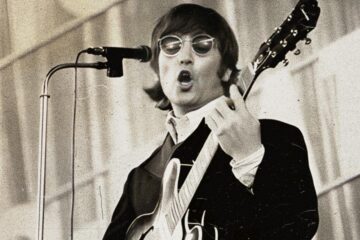The term “opposites attract” is only really applicable to magnetism, yet there is a degree of truth in human relationships. Whether it’s Laurel and Hardy, Asterix and Obelix, you and your partner or John Lennon and Paul McCartney, every successful duo prospers beyond the sum of its parts due to a harmony of passions and a dissonance of strengths and weaknesses.
With this in mind, the corny term “you complete me” is usually more accurate when it comes to iconic duos. This was certainly the case for The Beatles’ primary songwriting duo. Lennon and McCartney shared a zeal for rock ‘n’ roll performance and songwriting. This crucial shared passion demanded skills in composition and lyricism, which both boasted by the bucketload.
Lennon and McCartney worked together with superhuman telepathy, which gave the illusion that they were essentially the same person. However, their approaches were very different. When it came to instrumental dexterity and composition, McCartney showed the greatest strength within the band. Meanwhile, Lennon brought an oblique, darker edge to both his lyrics and delivery.
Looking back through The Beatles’ oeuvre, it is usually relatively easy to determine which side of the Lennon-McCartney partnership penned the lyrics for each song. Of course, early on, the band sang mainly of love and the pursuit thereof, but over time, McCartney established himself with ballads like ‘Yesterday’ and ‘Let It Be’ and “fruity” tracks like ‘Maxwell’s Silver Hammer’ while Lennon busied himself with “warm guns”, kaleidoscope eyes and revolution.
Throughout the late 1960s, from the desperate cry for ‘Help!’ to the heroin ruminations in ‘Happiness is a Warm Gun’ and ‘Cold Turkey’, Lennon’s songwriting became increasingly personal. Even the intensely abstract ‘Lucy in the Sky with Diamonds’ was allegedly a reference to a painting Lennon’s son, Julian, made for him.
Just as he left The Beatles in late 1969, Lennon wrote ‘Mother’, one of his most personal songs. This peak of raw emotion rose in sync with a peak in his political activism. Early in his solo career, Lennon and his wife Yoko Ono held various peace demonstrations in reaction to the Vietnam War and released corresponding songs, such as ‘Working Class Hero’, ‘Gimme Some Truth’ and ‘Happy Xmas (War Is Over)’.
Meanwhile, Paul McCartney maintained a sonic thread that was far from current affairs. Although inspired greatly by Bob Dylan’s early work, protest music never really interested McCartney. That is until 1972, when he released his first overtly political song, ‘Give Ireland Back to the Irish,’ in response to the events of Bloody Sunday.
Before McCartney released the 1972 single, which reached number one in Ireland and Spain, he could never get on board with Lennon’s political songwriting. “I always used to think, ‘God, John’s crackers, doing all these political songs.’”
Continuing, McCartney revealed that he “feels deeply” like Lennon but felt that songwriting and politics didn’t need to merge. “I think our mob do, our generation do hate that and wish it could be changed,” he said, “but up until the actual time when the paratroopers went in and killed a few people, a bit like Kent State, the moment when it is actually there on the doorstep, I always used to think it’s still cool to not say anything about it because it’s not going to sell anyway and no one’s gonna be interested.”
Of course, outside of his songwriting, McCartney is vocal in political matters and has devoted much of his time to campaigns close to his heart. Since ‘Give Ireland Back to the Irish’, his political songwriting has been relatively scarce, but with classic songs like ‘Blackbird’ in his locker, it appears he is simply more disposed to indirect artistic references.



